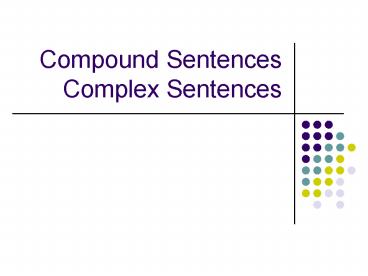Compound Sentences Complex Sentences - PowerPoint PPT Presentation
1 / 18
Title:
Compound Sentences Complex Sentences
Description:
Compound Sentences Complex Sentences Compound Sentences Compound sentences - formed when 2 complete sentences (independent clauses) are joined together with a ... – PowerPoint PPT presentation
Number of Views:162
Avg rating:3.0/5.0
Title: Compound Sentences Complex Sentences
1
Compound SentencesComplex Sentences
2
Compound Sentences
- Compound sentences - formed when 2 complete
sentences (independent clauses) are joined
together with a semicolon or a comma and a
conjunction - Ex. People saw patterns of stars in the sky, and
they gave them names. - People saw patterns of stars in the sky they
gave them names.
3
Coordinate Conjunctions
- Coordinate conjunctions the conjunctions that
join sentences together to form compound
sentences. - and for or yet
- but so nor
4
Using Nor
- Nor is a special conjunction that works a little
differently than the other conjunctions - V S V
- EX. I do not like orange juice, nor do I like
apple juice. - Notice how the second clause reverses the normal
subject/verb order.
5
Practice
- Combine the following sentences to form a
compound sentence - You must observe the rules. You must withdraw
from the race. (or) - I did well on the test. Maria did well, too.
(and)
6
Conjunctive Adverbs
- conjunctive adverb is an adverb that connects two
independent clauses. Conjunctive adverbs show
cause and effect, sequence, contrast, comparison,
or other relationships.
7
Conjunctive Adverbs Cont.
- Use a semicolon before the conjunctive adverb to
separate two independent clauses joined by a
conjunctive adverb. - Use a comma following the conjunctive adverb.
8
Conjunctive Adverbs Cont.
- Examples
- He went to the store however, he did not buy
- anything.
- Elaine wanted to high-five the friendly giant
- consequently, she had to jump to reach him.
9
Conjunctive Adverbs Cont.
- Common Conjunctive Adverbs
- accordingly furthermore moreover similarly
also hence namely still anyway
however nevertheless then besides next
certainly indeed nonetheless therefore
consequently instead now thus finally
likewise otherwise further meanwhile
10
Complex Sentences
- Complex Sentences 2 complete sentences joined
together by using a subordinate conjunction. One
sentence becomes a dependent clause. - Use a comma when the dependent clause comes at
the beginning of the sentence. Do not use a
comma if the dependent clause is found within the
sentence. - Ex. Before scientists invented telescopes, the
moon was hard to investigate. - The moon was hard to investigate before
scientists invented telescopes.
11
Subordinate Conjunctions
- after how since until
- although when so that if
- as whenever that than
- where because though unless
12
Remember this important point
- A subordinate clause cannot stand alone as a
sentence because it does not provide a complete
thought. The reader is left wondering, "So what
happened?" A word group that begins with a
capital letter and ends with a period must
contain at least one main clause. Otherwise, you
will have written a fragment, a major error.
13
- After Amy sneezed all over the tuna salad.
- So what happened? Did Amy throw it down the
garbage disposal or serve it on toast to her
friends? No complete thought fragment. - Once Adam smashed the spider.
- So what happened? Did Belinda cheer him for his
bravery or lecture him on animal rights? No
complete thought fragment.
14
- Until Mr. Miller has his first cup of coffee.
- So what happens? Is he too sleepy to work, or
does he have a grumpy disposition? No complete
thought fragment. - Who ate handfuls of Cheerios with his bare hands.
- So what happened? Were the roommates shocked, or
did they ask him to pass the box so that they
could do the same? No complete thought
fragment.
15
Practice
- Identify the dependent clause in the following
complex sentences. - Since historic buildings are protected by laws,
shipwrecks should be too. - Many beautiful ships were robbed before laws
existed.
16
Practice continued
- Combine the following sentences to form a
complex sentence. - A new wreck is discovered. People argue about
its exploration. (whenever) - Some divers will take objects from a shipwreck.
They find it. (as soon as)
17
Relative Pronouns
- Relative pronouns are used to form dependent
clauses in complex sentences. - EX. The child, who is wearing the overalls, is
my cousin. - The letter, which arrived Saturday, is from my
father. - I know the boy who lives in that house.
- The relative pronoun becomes the subject in the
dependent clause
18
Relative Pronouns
- who whom whomever
- whoever whose which
- that































